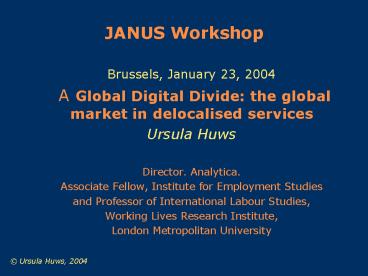JANUS Workshop - PowerPoint PPT Presentation
1 / 20
Title:
JANUS Workshop
Description:
2000 the EMERGENCE project. Aims: Measure the extent of eWork relocation ... www.emergence.nu. www.analytica.org.uk. www.stile.be. www.employment-studies.co.uk ... – PowerPoint PPT presentation
Number of Views:59
Avg rating:3.0/5.0
Title: JANUS Workshop
1
JANUS Workshop
- Brussels, January 23, 2004
- A Global Digital Divide the global market in
delocalised services - Ursula Huws
- Director. Analytica.
- Associate Fellow, Institute for Employment
Studies - and Professor of International Labour Studies,
- Working Lives Research Institute,
- London Metropolitan University
2
A new global division of labour in
information/knowledge-based services
- ICTs mean (in theory) that any task involving
the processing and/or transmission of digitised
information can be carried out anywhere where the
right infrastructure is present in combination
with the right workers - This (in theory) opens up new opportunities for
development all over the world - But what happens in practice?
3
Convergence or polarisation?
- The death of distance vs increasing importance of
the local - The possibility of delocalisation creates new
forms of competition between regions - New regional critical success factors
- Interplay of dynamism and inertia in shaping new
geographies - Tension between centralisation and
decentralisation tendencies
4
BUT trends are not universal or inevitable
- patterns are shaped by strategies of players on
both the supply and demand side - as well as by specific features of the local
environment - including cultural, political and geographical
patterns as well as economic ones
5
A brief historical overview
- 1960s-70s development of a global division of
labour in manufacturing industries ICTs played
a role in managing global production lines some
white-collar work involved (e.g. typesetting in
Hong Kong, Malaysia and Malta for UK customers) - Late 1970s beginning of export of bulk data
entry, e.g from US to Caribbean, Philippines,
China - 1980s large scale body-shopping from India to
more developed countries in software sector
6
The 1990s
- Global liberalisation of telecommunications
- Rapid spread of ICTs including the Internet
- Growth in delocalisable forms of employment (e.g.
call centres) - 1992 liberalisation of trade regulations
permitted software export from India - Development of market economies in Central and
Eastern Europe - Growing awareness of the death of distance
7
Contrasting national strategies in the mid-90s
- India rich in skills, poor in
telecommunications development of Satellite
Technology Parks, NASSCOM, Strong incentives to
export software or business processes - Malaysia Multimedia Supercorridor,
Cyberjaya, 20-20 Vision
8
The late 90s
- The dot.com boom
- Skill shortages in the North
- Millennium bug
- Conversion to euro
- Acceleration of digitisation processes
9
2000 the EMERGENCE project
- Aims
- Measure the extent of eWork relocation
- Identify forms and characteristics
- Identify favoured locations
- Find reasons for choice of location or supplier
- Explore dynamics of relocation
- Investigate employment implications
- Identify constraints and facilitators
- Identify indicators for future modelling and
tracking - Inform regional development strategies
10
Global statistical analysis Where the Butterfly
Alights
- e-tiger - 17 large rapidly developing countries,
often existing destinations - e-maybe - 19 states - with small, highly
educated population - source or destination - e-loser - 114 underdeveloped countries at
serious risk of exclusion
- e-leader - 6 large dominant source
economies - e-capable - 23 smaller highly developed
source economies - e-hare - 25 small but rapidly
developing countries - potential destinations
11
Relocation of work in Europe (demand side) by
type of eWork ( of establishments with gt50
employees)
Source EMERGENCE employer survey, 2000
12
eWork demand by business function ( of
establishments with gt50 employees)
Source EMERGENCE employer survey, 2000
13
Use of outsourced business services ( of
establishments with gt50 employees)
Source EMERGENCE employer survey, 2000
14
Reasons for choice of eOutsourcer (reasons for
choice of location, of all outsourced services)
Source EMERGENCE employer survey, 2000
15
62 European case studies of eWork relocation
involving international or inter-regional
relocation - typology
16
Complex dynamics of eWork relocation
- One off relocation can be first stage in major
restructuring. 2nd phase may be more destructive
of jobs - Outsourcing may become insourcing
- Choice of location is often by-product of choice
of outsourcer - 1st move creates preconditions for further
reolocations - Role of intermediaries
- Noticeable changes since mid-90s Indian
companies moving up the value chain
17
2003 Asian EMERGENCE
- offshoring has moved from an experimental to a
consolidation phase - now forms routine part of business practice
- Risk has been minimised by explicit quality
standards BUT things still go wrong! - New forms of intermediation
- Trends increasingly driven by supply as well as
demand side factors - Relocations within Asia as well as between
US.EU/Australia and Asia - Very rapid growth in China to a lesser extent
other destinations e.g. Sri Lanka, Vietnam
18
Employment Implications
- Digital divide within as well as between
countries - Qualitative as well as quantitative change in
jobs - Much offshoring is taking place in growth
sectors - Development in the South means new markets for
goods and services from the North - The key policy question is the social
distribution of the gains
19
A quick plug!
20
For more information go to
- www.monthlyreview.cybertariat.com
- www.emergence.nu
- www.analytica.org.uk
- www.stile.be
- www.employment-studies.co.uk































